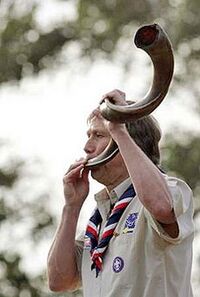Kudu horn: Difference between revisions
Jump to navigation
Jump to search

m (Robot: Removing from Category:Mammals of Africa) |
|||
| (22 intermediate revisions by 2 users not shown) | |||
| Line 1: | Line 1: | ||
A '''Kudu horn''' is a musical instrument made from the horn of the Kudu antelope. It is mostly seen as in the Western world in its use as a part of the [[Scouting]] movement's [[Wood Badge]] training program which, when blown, signals the start of a Wood Badge training course or activity. A form of it is sometimes used as a shofar in Jewish ceremonies. | |||
[[Image:Peter Duncan kudu.jpg|thumb|left|200 px|[[Peter Duncan]], British Chief Scout, sounding kudu August 1, 2007]] | |||
==Animal== | |||
The Kudu are two species of antelope: | |||
*Lesser Kudu, ''Tragelaphus imberbis'' | |||
*Greater Kudu, ''Tragelaphus strepsiceros'' | |||
The name of the animal was imported into English in the 18th century from isiXhosa ''iqudu'', via Afrikaans ''koedoe''. | |||
[[ | [[Category:Scouting]] | ||
[[da:Kuduhorn]] | |||
[[fr:Koudou]] | |||
[[nl:Kudu-hoorn]] | |||
Latest revision as of 07:17, 11 July 2014
A Kudu horn is a musical instrument made from the horn of the Kudu antelope. It is mostly seen as in the Western world in its use as a part of the Scouting movement's Wood Badge training program which, when blown, signals the start of a Wood Badge training course or activity. A form of it is sometimes used as a shofar in Jewish ceremonies.

Peter Duncan, British Chief Scout, sounding kudu August 1, 2007
Animal
The Kudu are two species of antelope:
- Lesser Kudu, Tragelaphus imberbis
- Greater Kudu, Tragelaphus strepsiceros
The name of the animal was imported into English in the 18th century from isiXhosa iqudu, via Afrikaans koedoe.